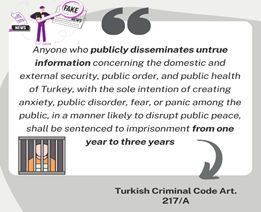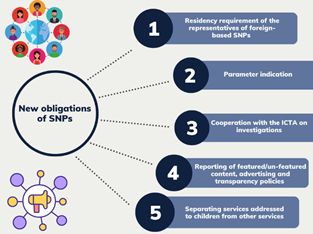- within Tax, Energy and Natural Resources and International Law topic(s)
- with readers working within the Media & Information industries
As the digital content consumption increase, social networks have an increasing importance in our daily lives. Accordingly, digital media companies have been at the crosshair of regulators around the globe. Catching this legislative trend, the Turkish parliament recently enacted a notable amendment on the rules that govern social networks. The amendments bring new areas of concern for social network providers ("SNP") and over the top ("OTT") service providers. Below, you may find a brief overview of the recent changes.
What happened?
General Assembly of Turkish Parliament approved an amendment on 13 October 2022 ("Amendment"). The Amendment has been promulgated in the Turkish Official Gazette and come into force on 18 October 2022.
A new type of crime: Publicly disseminating misleading information (Turkish Criminal Code Article 217/A)
 A new
crime is defined: Anyone who
publicly disseminates untrue information
concerning the domestic and external security, public order, and
public health of Turkey, with the sole intention of creating
anxiety, public disorder, fear, or panic among the public, in a
manner likely to disrupt public peace, shall be sentenced to
imprisonment from one year to three years.
A new
crime is defined: Anyone who
publicly disseminates untrue information
concerning the domestic and external security, public order, and
public health of Turkey, with the sole intention of creating
anxiety, public disorder, fear, or panic among the public, in a
manner likely to disrupt public peace, shall be sentenced to
imprisonment from one year to three years.
Changes made in The Law on the Regulation of Broadcasts via Internet and Prevention of Crimes Committed through Such Broadcasts numbered 5651 ("Internet Law")
- The Access Providers' Association's authority is
narrowed: The Association is no longer responsible
for block access decisions which are in the scope
of Article 8/A in addition to Article 8.
- Access providers are liable to establish technical mechanism to
notify decisions.
- The Association may notify the
decisions to remove the content and/or block
access to the electronic mail addresses of the relevant
content or hosting provider, which can be identified from
their websites.
- The president ("President") of
Information Technologies Authority
("Authority") can now ex
officio decide to remove or block the
content regarding all crimes laid out in the Article 8 and
crimes such as impersonating a National Intelligence Service
("NIS") member and forging a NIS
document.
- There is no longer distinction as to where the content or hosting provider is located (in Turkey or abroad) for the Authority to impose sanctions.
Changes in relation to obligations of SNPs
- Residency requirement has been introduced on
the representatives of foreign-based
SNPs with more than one million daily accesses
from Turkey: The naturel person
representative of the companies must be a resident in
Turkey as well as being a Turkish
citizen.
- If the daily access from Turkey to the website
is more than ten million, the representative of a
foreign-based SNP shall be fully
authorized and responsible for technical, administrative,
legal, and financial matters, without prejudice to
the responsibilities of the SNP. If the representative is a
legal entity, it must be organized as a
branch to be established by the SNP.
- SNPs' reports to the Authority shall
include specific information regarding their
algorithms for title tags, featured or un-featured content,
advertising policies and transparency
policies. The SNP shall take the necessary
measures in cooperation with the Authority for its
own system, mechanism, and algorithm regarding the
non-publication of content and title tags related
to the offenses under this Law and shall include
these measures in its reports.
- The SNP is obliged to include information as to which
parameters it uses when providing suggestions to
users on its website in a clear,
understandable, and easily
accessible The SNP shall take the necessary measures to
update users' preferences regarding the content it recommends
and to offer the option to limit the use of their
personal data and shall include
those measures in its reports. The SNP shall
create an advertisement library containing
information such as content, advertiser, advertisement duration,
target audience, number of people or groups reached, and
publish it on its website and
include this in its reports.
Those reports should also include relevant data regarding the
providers' obligation to neutrality towards
its users. The SNP is obliged to provide the Authority with
all information and documents
necessary for the implementation of the Law upon
request.
- The Authority may request all kinds of
explanations from the SNP regarding the SNP's
compliance within this Law, including
organizational structure, information systems, algorithms, data
processing mechanisms and commercial behaviors. The SNP is
obliged to provide the information and documents
requested within three months at the latest. The
Authority may inspect the SNP's
compliance with this Law on-site at
premises of the SNP.
- The SNP shall take the necessary measures to
provide disaggregated child friendly
- The SNP must provide the public authorities
with information regarding contents subject to
following crimes:
a) Child sexual abuse,
b) Publicly disseminating misleading information,
c) Disrupting the unity and territorial integrity of the state,
d) Offenses against the Constitutional Order,
e) Offenses against State Secrets and Espionage,
- The SNP's Turkish representative shall
share the relevant information to reach the
perpetrators who created or disseminated the internet
content to the judicial authorities upon request.
Failure to comply with these requests may result in a
judicial decision to reduce the internet
traffic bandwidth of the SNP by
90%.
 If the SNP
fails to comply with the content
removal and/or access blocking decision
issued by the President of the Authority, the President may decide
to prohibit natural or legal persons
resident in Turkey from advertising with
the relevant foreign SNP for up to six
months, and no new contract may be
established, and no money transfer may be
made in this context. A judicial decision may also be
obtained to reduce the internet traffic bandwidth
of the SNP by 50%. Administrative
fines may be imposed on real and legal persons resident in
Turkey who violate the advertising ban.
If the SNP
fails to comply with the content
removal and/or access blocking decision
issued by the President of the Authority, the President may decide
to prohibit natural or legal persons
resident in Turkey from advertising with
the relevant foreign SNP for up to six
months, and no new contract may be
established, and no money transfer may be
made in this context. A judicial decision may also be
obtained to reduce the internet traffic bandwidth
of the SNP by 50%. Administrative
fines may be imposed on real and legal persons resident in
Turkey who violate the advertising ban.
- The SNP is liable to establish a notice and takedown
mechanism in cooperation with the Authority to takedown
infringing title tags or featured content. The SNP is
directly liable for the content which is being
provided through title tags or featured content if it has been
notified of the unlawful content and has
not removed the content within four
hours at the latest from the notification of the
content.
- Upon being aware of a content that endangers the safety of life
and property and in case of urgency, the SNP shall
share this content and information about the creator of
the content with the authorized law enforcement
units.
- The social network provider is responsible for creating
a crisis plan for emergency situations affecting public
safety and public health and notifying the
Authority.
- The President may impose an administrative
fine of up to three percent of its global
revenue in the previous calendar year on
a SNP that fails to fulfil its obligations.
- If the SNP, which has designated a representative before the promulgation of the Amendment, fails to fulfil its new obligations brought by the Amendment within six months, the reduction of bandwidth and prohibition of advertisement would be imposed without need to apply any provisions regarding notification and administrative fines.
Changes in relation to obligations of OTT service providers
- With the amendments to the Electronic Communications Law, over
the top (şebekeler üstü, "OTT"-
internet-based) services are defined as
"interpersonal electronic communication services
within the scope of audio, written and visual communication
provided by means of publicly available software to subscribers and
users with internet access independently of the operators or the
internet service provided".
- OTT service providers should carry out their activities within
the framework of the authorization to be made by
the Authority through their fully authorized
representatives in the status of a joint stock
company or limited liability company established in
Turkey. Authority is authorized to issue necessary
regulations regarding these services and to take the relevant
measures.
- Administrative fines ranging from TRY one million to thirty million may be imposed on unauthorized OTT service providers.
What are the key takeaways?
In light of the foregoing, we see that the Amendments bring new rules and responsibilities set forth in various legislations including press, internet and criminal laws. In particular, SNPs are required to comply with an array of new responsibilities and adapt their operational procedures to the Amendments. Accordingly, notice and takedown procedures may need to be reviewed to ensure compliance with the amended Internet Law. Similarly, OTT service providers must comply with new obligations introduced by the Amendment as long as those services are provided publicly.
Based on the current legislative climate, we see that Turkey has a growing interest to closely regulateonline services and content consumption. Accordingly, we expect that public entities and law enforcement agencies will be motivated to uphold the Amendments and closely monitor whether major players are in compliance or not. Hence, it will be beneficial to cross-reference the Amendments with relevant actors' current position and have a deeper understanding on potential risks and liabilities.
The content of this article is intended to provide a general guide to the subject matter. Specialist advice should be sought about your specific circumstances.




